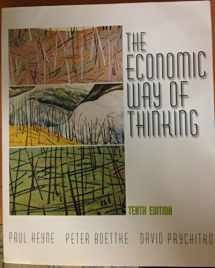
The Economic Way of Thinking (10th Edition)
ISBN-13:
9780130608109
ISBN-10:
0130608106
Edition:
10th
Author:
Peter J. Boettke, Paul T. Heyne, David L. Prychitko
Publication date:
2002
Publisher:
Prentice Hall
Format:
Paperback
529 pages
FREE US shipping
Book details
ISBN-13:
9780130608109
ISBN-10:
0130608106
Edition:
10th
Author:
Peter J. Boettke, Paul T. Heyne, David L. Prychitko
Publication date:
2002
Publisher:
Prentice Hall
Format:
Paperback
529 pages
Summary
The Economic Way of Thinking (10th Edition) (ISBN-13: 9780130608109 and ISBN-10: 0130608106), written by authors
Peter J. Boettke, Paul T. Heyne, David L. Prychitko, was published by Prentice Hall in 2002.
With an overall rating of 4.0 stars, it's a notable title among other
books. You can easily purchase or rent The Economic Way of Thinking (10th Edition) (Paperback) from BooksRun,
along with many other new and used
books
and textbooks.
And, if you're looking to sell your copy, our current buyback offer is $0.32.
Description
The Economic Way of Thinking develops the basic principles of micro- and macroeconomic analysis, and rigorously employs them as tools rather than ends unto themselves. This book introduces readers to a method of reasoning; to think like an economist—teaching through example and application. It even teaches by showing learners how not to think, by exposing them to the errors implicit in much popular reasoning about economic events. Chapter topics include opportunity cost and the supply of goods, supply and demand, profit and loss, competition and monopoly, price searching, competition and government policy, the distribution of income, markets and government, the overall performance of economic systems, the supply of money, monetary and fiscal policies, national policies and international exchange, employment and unemployment, promoting economic growth, and the limitations of economics. For individuals seeking a deeper understanding of the effects of world events on the economy and vice versa.


We would LOVE it if you could help us and other readers by reviewing the book
Book review

Congratulations! We have received your book review.
{user}
{createdAt}
by {truncated_author}


